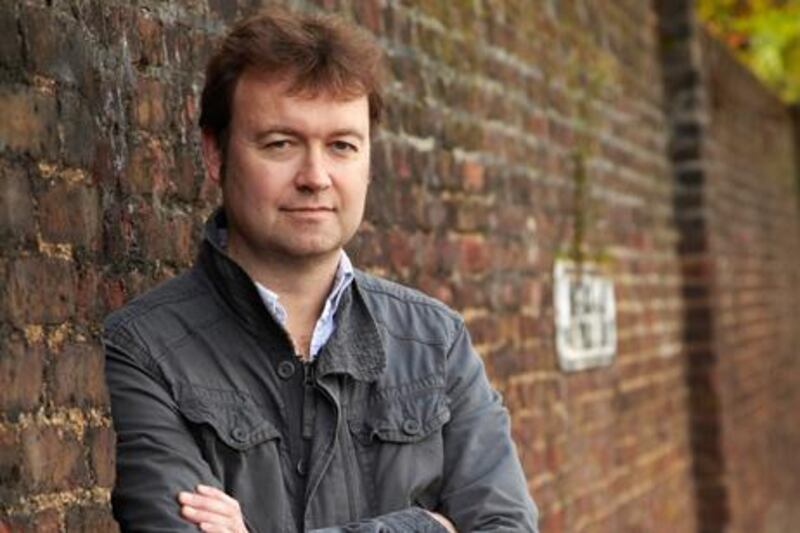"It's just not an episode of my life that I often think about these days, as it was so traumatic," the crime novelist Simon Kernick says, sighing heavily. "For years, I blanked it out almost completely and never spoke about it."
We've touched upon a nightmarish episode from Kernick's teenage years, an encounter that the young Kernick wasn't sure he was going to survive.
But, as Kernick admits himself, if ever the oft-quoted dictum "write about what you know" was apposite for writers, then it is doubly so for him.
Because Kernick, whose books are as scary and violent as they are gripping and difficult to put down, doesn't only talk the talk. This is a man who has walked the walk, too.
His breakthrough novel in 2006, Relentless, a staple of UK television's Richard and Judy Book Club, was inspired by horrific events that happened in July 1983, when Kernick was a 16-year-old, hitch-hiking with two friends.
Kernick, now 45, takes up the story: "A car, in a seemingly endless stream of cars, sped past us but suddenly braked a hundred yards or so up the road. It then reversed really quickly. I think then we should have smelled a rat but we were 16 and desperate for a lift so we squashed into a really old Ford Escort with these three older guys."
Kernick pauses for a moment, then continues: "It was only a short journey to town, and the conversation was friendly as we all made small talk. And then it happened. The car stopped on a quiet stretch of the road and the man in the front passenger seat said, 'All right, lads, empty your pockets.' He said it so calmly, in such a matter-of-fact way, that I was still wondering if I'd heard him right when the driver leaned over his seat and punched me twice in the face.
"Then they all started punching us. We were helpless as they beat us into submission. Then the car pulled away, the man in the front seat once again telling us to empty our pockets. We did what we were told, but we hardly had anything - a few quid in change, some cigarettes - and it certainly wasn't enough for our attackers. So they told us to take our clothes off."
Kernick stops again. It's clearly a painful memory.
"Even now I can remember how terrified I was. We began to undress slowly as two of the attackers watched us. They even made us take off our underwear. Then the car turned off the main road and headed down a track into woodland. They made us get out and herded us, naked and terrified, before lining us up in a row. 'Let's do 'em,' said the front-seat passenger. 'I'll get the shotgun,' replied the driver, going back to the car and reaching under the seat. I really thought that this was it. "My life really did flash before me, too. I thought of all the things I wished I could have done and the places I could have seen. I was going to die. But then one of my friends made a break for it, and disappeared into the woods and the attackers just suddenly seemed to lose interest and let us all run off.
"Looking back now, it was just a nasty game for them. There was never a shotgun - they were just bullies. Didn't make any difference at the time, though - it was terrifying. The police even knew who they were but they couldn't press charges as it was our word against theirs and the car was never found."
Today, Kernick is not a man given to melancholic introspection. He's good company: funny, chatty and with a noticeable lack of ego, something not always apparent with best-selling authors.
Perhaps this absence of self-regard is due to Kernick's long struggle for success. He really has paid his dues.
"I always wanted to be a writer, ever since I was a very young kid," he says, "and so I was writing short stories - rubbish short stories - at six or seven and I just developed that."
So Kernick must have been a star English pupil at school.
He laughs. "No, I certainly never did that well at English in school. I left with an 'E' grade A-Level - and that was at my second attempt! I went back to college and when I was finally back out in the working world in my mid-twenties, I realised I desperately wanted to be a writer. So I wrote my first crime book in my late twenties."
Unfortunately, that book and its successor, A Fine Night for Dying ("bloody awful" is Kernick's evaluation of that now), attracted no interest at all, the latter being rejected by more than 200 agents and publishers. But still Kernick did not give up and, finally, in 2001 when his third attempt, The Business of Dying, was picked up by the publisher Transworld, he was finally able to give up his day job as a software salesman.
Now he's one of the UK's most successful authors. His last novel, The Payback, went straight to number one in the bestsellers' chart, and his 11th book Siege, a hugely ambitious thriller focusing on international terrorism, right-wing extremism and a bloody hotel siege in London, is almost certainly destined to build further on Kernick's global reputation. But he's worked his socks off for all this and displayed extraordinary tenacity. Did he ever feel like giving up in the late 1990s, when he was receiving rejection letter after rejection letter?
"Occasionally," he admits. "But I would still have written. It's what I love to do. I imagine it's what I'll always love to do."
He's come a long way from being that terrified lad in the forest.
Siege (Transworld) is out in bookstores on Wednesday. For more info, visit www.simonkernick.com






